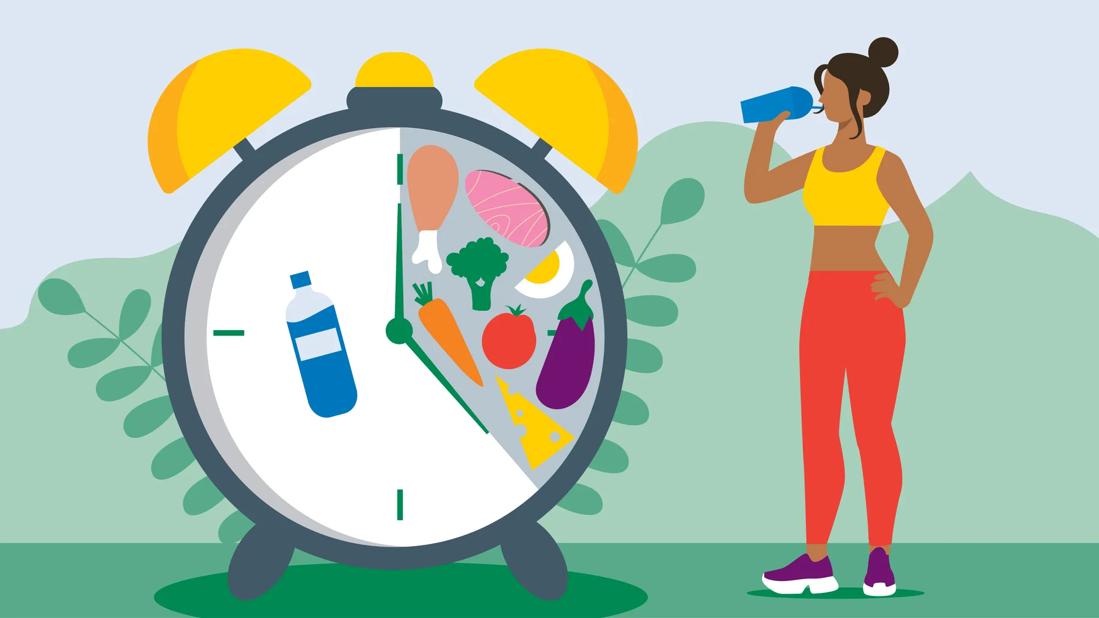Studies show intermittent fasting may help you lose weight, improve blood pressure and more

On the hunt for an eating pattern that can help improve your heart health? There’s no shortage of diets that promise to do that, like the Mediterranean diet or DASH (Dietary Approaches to Stop Hypertension).
Advertisement
Cleveland Clinic is a non-profit academic medical center. Advertising on our site helps support our mission. We do not endorse non-Cleveland Clinic products or services. Policy
But improving your heart health may not be only a matter of what you eat, but also when you eat. (Along with things like exercise, reducing stress and sleeping well, of course.)
We talked to registered dietitian Julia Zumpano, RD, LD, to get to the heart of intermittent fasting.
Intermittent fasting first became popular around 2015. Since then, it’s become more and more mainstream.
Eating in shorter windows can mean you’re eating fewer calories. Cutting down on calories can lead to weight loss. And for people who have overweight or obesity, moving toward a healthy body mass index (BMI) can bring on a slew of heart-healthy benefits.
“Most people actually experience a decrease in hunger with certain types of fasting,” Zumpano shares. “This is due to fasting regulating your hunger hormones, which can lead to a shift in your body’s hunger cues.”
Major scientific studies have suggested that intermittent fasting can improve your overall health — and your risk for heart disease — especially for people with overweight or obesity.
Among the heart-healthy benefits:
Advertisement
All that said, you may have also heard some chatter about the supposed downsides to intermittent fasting.
Preliminary research presented at an American Heart Association conference in 2024 raised some questions about the long-term effects. It suggested that people who restricted their eating to eight hours or fewer per day were at an increased risk for death from cardiovascular disease.
That sounds like a highly alarming finding, for sure. But the study had some major flaws.
For starters, participants in the survey self-reported when they ate just a few times over the eight-year study period.
What’s more, the survey didn’t take into account things like what participants ate and other lifestyle factors that affected their heart health, like whether they engaged in exercise and other healthy habits.
“The study didn’t prove causation,” Zumpano notes. “If you’re going to study long-term effects, it would be ideal to study a group of people who purposefully participate in intermittent fasting. It would be best to monitor or control their dietary intake to include foods that promote heart health. Then, the outcome can be properly assessed. But that kind of high-quality research on intermittent fasting hasn’t been done yet.”
Basically, the long-term effects of intermittent fasting on your heart are still to be seen. But given the overwhelming evidence we do have about fasting’s benefits, it could be worth a try as one strategy to improve your heart health, if a healthcare provider says it’s OK.
Ready to hop on the intermittent fasting train? Hold up a moment. There are some best strategies to make sure you’re following a healthy plan for you.
“It’s not for everyone,” Zumpano clarifies. “There are several types of fasting that you can try out. Consider meeting with a registered dietitian or a primary care provider to talk about whether fasting is for you, and which kind is advised.”
Intermittent fasting can be good for your heart — but it’s not your best choice if:
You also need to choose a proper eating schedule. For some people that means only eating certain hours of the day. Others follow a schedule where they eat throughout the day but scale way back on calories on certain days.
Advertisement
But regardless of what schedule you follow, eating a healthy diet is key.
“You’re not going to have the same benefits eating a high-calorie, high-fat diet for eight hours a day as you will if you follow a heart-healthy diet during those eating windows,” Zumpano states.
Advertisement

Sign up for our Health Essentials emails for expert guidance on nutrition, fitness, sleep, skin care and more.
Learn more about our editorial process.
Advertisement

Alternating between periods of eating and fasting may benefit your health

This plant-based eating plan focuses on lowering cholesterol, making it a great companion to the Mediterranean diet

Choose foods that are low in fiber and easy to chew and swallow

The flexible eating plan aims to boost your brain health by focusing on plant-based foods and limiting saturated fat

Designed to lower your blood pressure, this eating plan focuses on heart-healthy foods like whole grains, fruits and vegetables

Pescatarians don’t eat poultry, game or red meat, but they do eat fish and seafood, dairy and eggs

This eating style has many health benefits, including weight loss, an improved microbiome, and increased nutrient and mineral consumption

Research shows promising results from options like the DASH diet and Mediterranean diet

The tropical fruit is a good source of antioxidants and vitamin C

Most people fall asleep within 10 to 20 minutes, but if your experience is different, adjusting your sleep schedule may help

Exploring your hidden side can lead to better understanding of what makes you tick